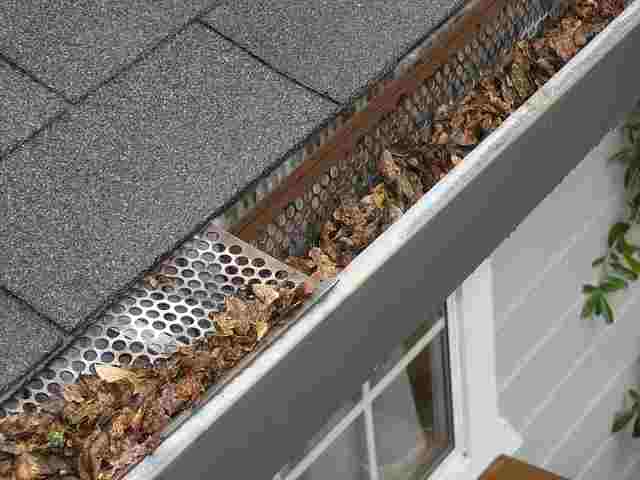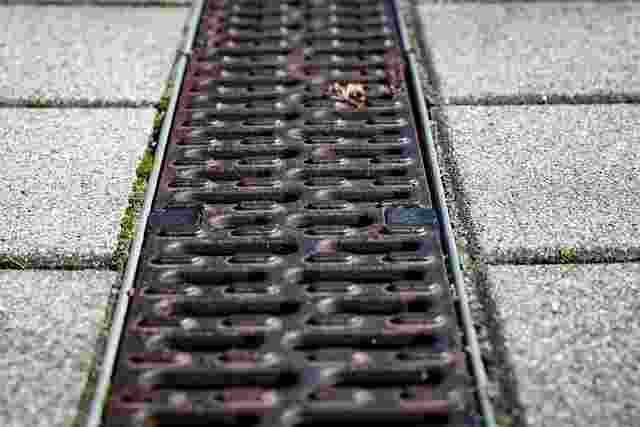Are you considering replacing or installing gutter guards on your home in 2023? If so, you may be wondering about the cost of gutter guard installation and replacement. This article will provide you with an overview of the current costs of gutter guard installation and replacement in 2023, so you can make an informed decision when it comes to protecting your home from water damage.
Read on to find out more about the gutter guard installation cost and gutter guard replacement cost and available grants.
Types of Gutter Guards
Gutter guards are designed to protect your home’s gutters from debris and other elements, while also allowing water to flow through them. There are several types of gutter guards available, each with its own advantages and disadvantages.
Mesh Gutter Guards: Mesh gutter guards are made of a plastic or metal mesh and fit snugly over the top of your existing gutters. They allow water to flow through while also blocking leaves and other debris from entering your gutters. These are an inexpensive option that can be easily installed without the need for professional help.
Foam Gutter Guards: Foam gutter guards are made of a flexible foam material and attach to the bottom edge of the gutter system. The foam is porous, allowing water to pass through while blocking leaves and other debris from entering your gutters. These are a more expensive option than mesh guards, but they provide superior protection against clogging.
Reverse Curve Gutter Guards: Reverse curve gutter guards are the most expensive option, but they offer the most protection against clogging and overflowing gutters. The reverse curved design helps to keep leaves and other debris out of the gutters while also providing an efficient flow of water.
Surface Tension Gutter Guards: Surface tension gutter guards use a slick surface to create a seal between the guard and the gutter itself, allowing only water to enter the gutter system. This type of guard is easy to install and very effective at keeping leaves and other debris out.
These are the most popular types of gutter guards, but there are other options available, such as perforated guards, screen guards, and self-cleaning guards. Be sure to research all of your options before making a decision about which type of gutter guard to install.
Gutter Guard Materials
When choosing a gutter guard, one of the most important considerations is the type of material you will use. The material used to construct the gutter guard affects its durability, strength, and overall effectiveness. Generally speaking, there are three main materials used to make gutter guards: plastic, metal, and foam.
Plastic Gutter Guards: Plastic gutter guards are an economical choice for homeowners who are looking for a low-cost option. They are available in a variety of sizes and styles, and they are generally easy to install. The downside to plastic gutter guards is that they don’t last as long as other materials, and they are not as effective at keeping out leaves and debris.
Metal Gutter Guards: Metal gutter guards are a popular choice for homeowners who want maximum protection for their gutters. They are made from aluminum, copper, or steel, and they provide superior strength and durability. The downside is that they are usually more expensive than plastic gutter guards, and they require professional installation.
Foam Gutter Guards: Foam gutter guards are becoming increasingly popular due to their affordability and ease of installation. They are lightweight and easy to install without the help of a professional. However, foam gutter guards can be less effective at keeping out leaves and debris. They also need to be replaced more frequently than metal or plastic gutter guards.
The Average Cost To Replace Gutter Guard in 2023
Replacing your gutter guard can be a daunting task. Depending on the type of guard and material, the costs of replacement will vary. In general, replacing your gutter guard in 2023 can range from $4.25 to $17.50 per linear foot.
Mesh Gutter Guard Replacement: Mesh gutter guards are usually the cheapest option for gutter protection. Mesh gutter guards are typically made of galvanized steel and come in various sizes, shapes, and colors. The cost of replacing mesh gutter guards in 2023 ranges from $4.25 to $8.00 per linear foot, depending on the size and quality of the mesh gutter guard.
Foam Gutter Guard Replacement: Foam gutter guards provide a higher level of protection than mesh guards and are also more expensive. The cost of replacing foam gutter guards in 2023 ranges from $8.00 to $17.50 per linear foot, depending on the size and quality of the foam gutter guard.
Two other types of gutter guards you might consider are reverse curve gutter guards and surface tension gutter guards. Reverse curve gutter guards are designed to catch debris before it can enter your gutter, while surface tension gutter guards are designed to cause water to sheet off the guard and into the gutter.
The cost of replacing reverse curve or surface tension gutter guards ranges from $5.00 to $15.00 per linear foot, depending on the size and quality of the guard.
New Guttering: If you need to replace the entire guttering system, you should expect to pay between $4.50 and $15.00 per linear foot for new guttering. This cost will depend on the type and quality of the guttering you choose. Additionally, installation fees may also be required for this type of project.
The Average Cost To Install Gutter Guard in 2023
The cost of installing gutter guards varies depending on the type of guard and the size of your home. Generally, it will range from $1,000 to $3,000.
Mesh Gutter Guard: Mesh gutter guards are the most common type of gutter protection system, and can cost anywhere from $750 to $2,500 for installation. The main advantage of mesh gutter guards is that they are the least expensive option, and their lightweight design makes them easy to install.
Foam Gutter Guard: Foam gutter guards offer good protection from debris and clogs, but they can be difficult to install. The average cost of installing foam gutter guards is between $900 and $2,700.
Reverse Curve Gutter Guard: Reverse curve gutter guards offer superior protection against debris and clogs. They are more expensive than mesh or foam gutter guards, but provide the best protection against water overflow. The average cost of installing reverse curve gutter guards is between $1,200 and $3,000.
Surface Tension Gutter Guard: Surface tension gutter guards provide good protection from debris, but require professional installation. The average cost of installing surface tension gutter guards is between $1,500 and $3,500.
New Guttering: If you need to replace your old guttering as well as install gutter guards, then you will need to factor in the cost of new guttering. The average cost of new guttering is around $500 per linear foot.

In conclusion, the average cost to install gutter guards in 2023 will range from $1,000 to $3,500 depending on the type of guard and the size of your home. Make sure to get quotes from several contractors in order to find the best price for the type of guard you want.
How Much Does It Cost To Clean Gutters
Cleaning out gutters is an important part of home maintenance that should be done on a regular basis. The cost to clean gutters depends on several factors, such as the size of the gutters, the type of debris that needs to be removed, and any repairs or replacements that may need to be done. On average, the cost to clean gutters can range from $50 to $250, depending on the size of the home and the amount of debris that needs to be removed.
For larger homes with multiple stories or homes with a lot of trees surrounding them, it is possible that the cost of cleaning gutters could be higher. This is due to the extra time and effort required to clean out large gutters that are clogged with leaves, twigs, and other debris. In some cases, a homeowner may need to replace the entire gutter system. The cost for gutter replacement can range from $1,000 to $4,000, depending on the size and type of gutter material used.
The cost of replacing a roof can also be factored into the cost of cleaning gutters. If there are signs of damage or leakage in the roof due to blocked gutters, then it may be necessary to replace some or all of the roofing materials. Roof replacement can range from $4,000 to $20,000 depending on the extent of the damage and the size of the roof.
Overall, the cost of cleaning gutters is an important part of maintaining your home. The cost can vary depending on the size of your home and any repairs or replacements that may need to be done. Taking care of your gutters now can help prevent costly repairs down the line, so it is important to stay up to date on their maintenance.
Grants Available For Gutter Guard Replacement and Installation 2023
The Federal Home Improvement Grant Program provides funds for homeowners to make necessary home repairs and improvements. This includes the installation or replacement of gutter guards. To qualify, you must have an income below a certain level, be current on your mortgage payments, and own and occupy the property.
Many states also offer grants specifically for home improvement projects. For example, the Ohio Home Energy Efficiency Grants Program offers up to $2,000 to homeowners to help offset the costs of installing gutter guards. Similarly, the Georgia Power Home Energy Improvement Program offers up to $1,200 in rebates for gutter guard installations.
Local utility companies may also offer rebates for home energy efficiency projects, including gutter guard replacement and installation. Reach out to your local power company to see if they offer such incentives.
Finally, many cities have home improvement loan programs that can provide low-cost financing for energy-efficient upgrades, such as gutter guard replacement and installation. Contact your local government office to find out if such a program exists in your area.
All of these grants, rebates, and loan programs can help reduce the cost of installing or replacing gutter guards in 2023. Doing so can save you money in the long run by improving the efficiency of your home’s drainage system and protecting your roof from damage caused by debris buildup.